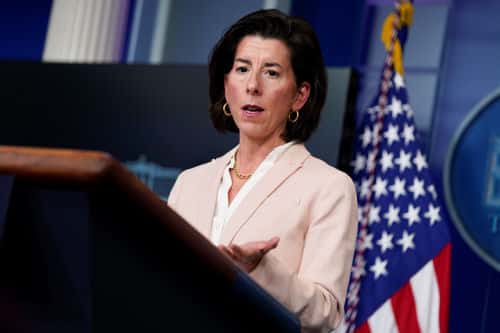Commerce Secretary Urges Senators to Pass the Bipartisan Innovation Act

WASHINGTON — Billions of dollars will start flowing to the Department of Commerce if Congress passes the Innovation and Competition Act, also known as the Bipartisan Innovation Act, funds that will transform the department’s upcoming budget, according to Commerce Secretary Gina Raimondo Wednesday.
“I want to be crystal clear about this. We cannot do anything unless and until Congress passes the law [and] gets it to the president’s desk,” Raimondo said during the Department of Commerce Fiscal Year 2023 Budget Priorities hearing to the Senate Committee on Commerce, Science and Transportation.
“So we have to put our shoulders to the grindstone in this conference. We cannot wait. We cannot delay. Other countries are not waiting and we have to get this to the president’s desk,” she said.
The Bipartisan Innovation Act, to be overseen by the Commerce Department, will provide about $54 billion primarily focused on increasing semiconductor manufacturing, said Sen. Maria Cantwell, D-Wash. That’s tens of billions of dollars more than the department’s proposed $11.7 billion.
The department’s budget also looks ahead, allocating money for various cybersecurity and data initiatives, including $1.5 billion to rehaul the Census Bureau’s data collection. Raimondo also mentioned money needed for the National Oceanic and Atmospheric Administration to help coastal cities and develop fish farms.
The Bipartisan Innovation Act will also provide funds for domestic manufacturing of semiconductors, also known as microchips. Boosting domestic production of such critical components of modern technology would reduce U.S. dependence on foreign supply chains.
The act would also create the Supply Chain Resilience and Crisis Response Office at the Department of Commerce, which would monitor national supplies and help manufacturers ensure Americans get their products quickly.
Inflation and supply chain issues seemed to be top of mind for many of the senators questioning Raimondo.
“I would suggest, senator, that the single most important thing you, or any senator, could do to ease the inflationary pressures and supply chain problems in your state is to quickly pass USICA or the Bipartisan Innovation [Act],” Raimondo said. “We will never fundamentally be able to solve these problems for your constituents until that law is passed and the federal government is implementing it.”
Both the House and Senate have passed versions of the bill. Shortly before the recent congressional break, 107 members of the House and Senate were named to the conference committee that is now looking to reconcile the differences between the Senate-passed Innovation and Competition Act and the House-passed America COMPETES Act.
This is also going to spur economic development across the country, Sen. Todd Young, R-Ind., said. During the hearing, he asked Raimondo about the “tech hubs” that would be created with this legislation.
The Bipartisan Innovation Act allows money to flow into other parts of the country to increase innovation and manufacturing with “tech hubs.”
“The tech hubs are every bit as important. And they are designed to create ecosystems of innovation in communities around the country that have been overlooked,” Raimondo said. She gave the example of how Purdue University in Young’s state was creating programs and degrees specifically targeted at studying semiconductors and microelectronics. The hope is that such research will attract businesses to foster those tech hubs across the country, she said.
And that will happen in other areas of innovation as well, she said.
“We need more semiconductor manufacturing capacity. … We need to start increasing our innovation in all emerging technologies — in semiconductors, in design, in packaging, in energy efficiency. And all of that starts at the ground level,” Raimondo said. “It isn’t all going to happen in Silicon Valley, Boston and Austin, Texas. So this is about getting [it] throughout America.”
Madeline can be reached at [email protected] or on Twitter at https://twitter.com/ByMaddieHughes























